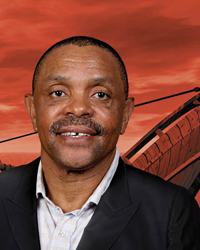 Siphiwe Nyanda
Siphiwe Nyanda
Is the DOC a sinking ship?
"A horrible year" is the best way to describe communications minister Siphiwe Nyanda's first 18 months in office. Very little, if anything, has turned out according to any kind of plan and his department has been described by his own acting director-general, Harold Wesso, as a "sinking ship".
Ministers are political appointments, and so by the very nature of them assuming office they are not really expected to know anything about the technicalities of the industry or sector they are supposed to have oversight of. Their job is to ensure that whatever department they are in charge of carries out the policies of the government of the day.
But don`t expect Nyanda to be suddenly reshuffled or relieved of his duties anytime soon. As at least one political analyst says, Nyanda is carrying out his political mandate, the rest is detail.
Nyanda`s term of office got off on a poor start in terms of public image. The purchase of two BMW luxury motor cars during a time when austerity measures were expected from the population in general, during the throes of an economic depression, immediately lent credence to the impression that he was in this job only because he was owed political favours, and this was a time for him to make his own personal fortune.
 The DOC is a sinking ship.
The DOC is a sinking ship.
Causing even more damage was the fact that Abolozi Risk Advisory Services (formerly General Nyanda Security Risk Management Services) had benefited from being awarded Transnet contracts. President Jacob Zuma" rel=tag>Jacob Zuma chastised Nyanda, along with his Cabinet colleague, Jeff Radebe, for publicly supporting fired Transnet Freight Rail CEO Siyabonga Gama.
Former communications minister, the late Ivy Matsepe-Casaburri, was no ball of fire lighting up the ICT sector, but she was never personally surrounded by as much controversy as Nyanda has been.
"The former minister had two things going for her. Firstly, she really did care about the poor, and secondly, she was never tainted by corruption scandals. She also managed to lead the department and become a mother figure to them; this generated a lot of loyalty there, no matter how heavily criticised her policies were," a former aid says.
Looking at the performance of the Department of Communications over the past year, there is an astounding lack of achievement, and it is an entity that is riddled with inefficiencies, lack of proper governance, low staff morale in itself, and of the various state-owned entities under its belt.
What achievements could be attributed to the DOC were those plans that had been put in place several years ago and were only recently fulfilled.
MANAGEMENT TURMOIL
Overshadowing the lack of achievement has been the management turmoil within the department itself. Nyanda, along with Cabinet, appointed Mamodupi Mohlala as the director-general. Mohlala had proved to be a rather controversial councillor at ICASA; however, for two years she appeared to have lived a low profile life as the Pension Fund Adjudicator.
Nyanda`s firing of Mohlala (more on that later) proved that things were not what they should be.
The most dramatic and public intervention by Nyanda (while Mohlala was still director-general) was during the raging debate on cellphone interconnection rates. This was an issue that struck a chord with every citizen who had been complaining for some time that mobile call rates were too high. Furthermore, the cost to interconnect between networks was also acting as a barrier to competition and so unfairly excluding more market entrants, which would have reduced costs.
All politicians instinctively know that politics is a numbers game, and if one is able to deliver something that the population really wants, such as cheap call rates, then the chances are good that they will vote for you.
Nyanda, seeing that Parliament, through its public hearings process during the latter part of 2009, was stealing the march on him, issued a policy directive to the telecommunications regulator to formulate regulations to cut the cost of interconnection.
However, in early November 2009, barely six weeks after issuing it, Nyanda had to withdraw the directive after having "consulted with the industry players" during his famous "I have given the nation a Christmas box" speech.
Essentially, that policy directive was issued beyond his powers. ICASA is independent, and will do whatever it needs to do within the ambits of the law to draft such regulations.
The upshot is that there has been no real movement in the retail pricing of cellular calls. The interconnection rate has been reduced from 125 cents to 89 cents, with the glide path to further reductions.
PROCEDURAL IMPACT
"What we have to distinguish here is the difference between procedural powers and the impact on pricing," says Alison Gillwald, executive director of ICT Research Africa. "That intervention did bring down the interconnection cost that may help new players enter the market, and we saw promotions of new cellular packages that may have been cheaper than before, but the real impact on the consumer has been negligible."
Unforeseen consequences are often the result of sudden proclamations that have not been thought through properly. The classic case has been that of ICASA councillor - or not - William Stucke, who has not been able to effectively take up his position, despite having been appointed by Nyanda, via a Government Gazette notice, despite not having resolved his conflict of interest.
The result of this is that ICASA, since November 2009, has been paying Stucke his full salary, without the benefit of using him as a councillor.
And now this whole issue is going to the Cape Town High Court, at the joint request of Parliament`s communications committee, which is responsible for the final appointment, but never took time to figure this out.
The ICASA Amendment Act is very clear on the issue.
"Mistakes (on Stucke`s appointment) were made all round. The DOC should have checked the law, we should have checked, as well before making the appointment public in the National Assembly, and Stucke could have also checked and not just assumed office," says Parliamentary Communications Committee chairperson Ismail Vadi.
One of Nyanda`s own advisors says: "The court case will be a good thing as it will tell us how far we have to go in determining the law."
However, Stucke`s legal representative, Dominic Cull" rel=tag>Dominic Cull, says: "The law is very clear. All they have to do is revoke the original notice of (Stucke`s) appointment, ensure the conflict is resolved and then reappoint him."
DIGITAL DISASTER
Moving South Africa`s obsolete broadcasting system from analogue to digital was always going to be problematic.
"If you really want to see blood on the streets, then take away peoples` ability to watch TV," former ANC MP Randy Pieterse once told the communications committee.
Cabinet approved the use of the European digital broadcasting standard four years ago, with the decision that the period of the dual use of analogue and digital signals would start on 1 November 2008 and end 1 November 2011. With just over a year to go to the end of the period, the country has no idea if the European or the Brazilian/Japanese standards are to be used, or even if TV will be broadcast.
Nyanda, along with his former director general, earlier this year set the cat among the pigeons by openly insisting that the Brazilian/Japanese standard should be investigated. Fact-finding trips to Brazil were set up, colloquiums were arranged, SA Development Community conferences were held and the minister made a personal appearance in Parliament to "explain" the rationale.
"All of this created such confusion that companies that were geared up to invest with the chosen standard stopped, Parliament had a very expensive fact-finding trip of its own, and now we are just sitting waiting for a final decision," says one broadcasting lawyer, who asked not to be named as he works for a major private broadcaster.
Glancing at some of the entities in the DOC portfolio is not pretty. National signal distributor Sentech appears to be in turmoil with its senior management being accused of dishonesty by its new board chairman Quaresh Patel, the SA Broadcasting Corporation is in a continuous state of calamity, and ICASA, probably the most important body within the communications sector, is still muddling along at its own sweet pace.
The DOC itself has come under fire by the Auditor General for fruitless and wasteful expenditure of more than R8 million, and accused the "accounting officer" of not following National Treasury regulations. Issues surround tender processes and disciplinary hearings concerning several top staff have not been resolved either.
YOU`RE FIRED
Nyanda has also failed to explain why he fired Mohlala. Certainly, she was not popular within the department, but love or hate her, labour laws have to be followed.
"He did not supply an answering affidavit to Mohlala`s court application, which means that the state has to pick up the legal costs," says one labour lawyer.
These costs are rapidly approaching the R1 million mark as the whole issue continues to drag out.
Independent political analyst Daniel Silke says: "Nyanda`s appointment is typical of what happens when a person is appointed because he or she is allied or friendly with those in power. This appointment, while political, does require some expertise, for which he lacks experience.
However, Nyanda is behaving as a person who is still carrying out the mandate of his political appointment."
|
Post a comment
|


